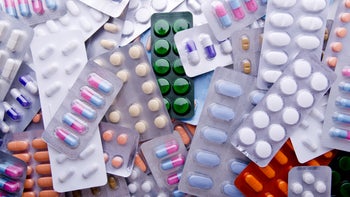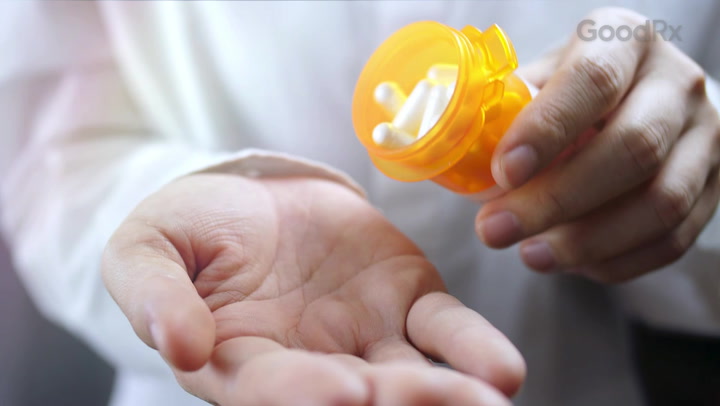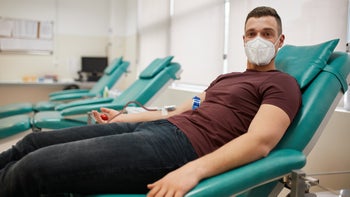
11 Medications That Can Cause Depression as a Side Effect
Key takeaways:
Certain medications can cause or worsen depression symptoms, such as sadness, trouble focusing, and sleep changes.
Corticosteroids, anticonvulsants, and opioids are a few examples of medications that can cause depression. Hormonal contraceptives, stimulants, and proton pump inhibitors (PPIs) may also cause depression.
If you notice any symptoms of depression after starting a new medication, it’s important to tell your healthcare professional. They can help you determine if the medication or another factor is contributing to your symptoms.
Access savings on related medications
Table of contents

It can be overwhelming to suddenly experience depression symptoms — such as sadness, trouble focusing, or sleep changes — that affect your daily life. Trying to pinpoint the exact cause of depression can be difficult, as well. But there are certain factors that can raise your chances of experiencing depression. Your medical history, genetics, and life circumstances are a few examples. Even certain medications can play a role.
Here, we’ll discuss 11 common medications that can cause depression or worsen its symptoms.
1. Corticosteroids like prednisone
Corticosteroids treat a wide range of inflammatory health conditions. They work by reducing swelling in your body and calming the activity of your immune system. Common examples of corticosteroids are prednisone (Rayos), dexamethasone, and methylprednisolone (Medrol).
Search and compare options
Corticosteroids can also cause imbalances in neurotransmitters, or chemical messengers, in your brain. And these imbalances have the potential to affect your mental health. Corticosteroids have been shown to increase the risk of depression, anxiety, and insomnia in some cases. Irritability is also a potential side effect.
Depression symptoms caused by corticosteroids are more likely with certain dosages. While they can appear within the first 5 days after starting treatment, taking corticosteroids long term can also cause depression symptoms.
Depression is less likely among people applying corticosteroids topically to the skin. With topical corticosteroids, not as much medication is absorbed by the body.
2. Parkinson's medications like Sinemet
Depression is common among people living with Parkinson’s disease. The condition itself can cause changes in brain chemistry that contribute to depression and anxiety.
Medications that treat Parkinson’s disease can also contribute to depression. According to one study, levodopa can worsen depression symptoms — especially when taken at high dosages. Levodopa is an active ingredient in Sinemet (carbidopa / levodopa), a common Parkinson’s medication.
On the other hand, the same study found no link between dopamine agonists and depression. Dopamine agonists, which work by raising dopamine levels in the brain, are another option for treating Parkinson’s disease. Examples include pramipexole (Mirapex ER), ropinirole, and rotigotine (Neupro).
3. Hormonal contraceptives
Hormonal contraceptives are a type of birth control that use specific versions of estrogen and/or progestin (sex hormones) to prevent pregnancy. Some common examples include birth control pills and patches, intrauterine devices (IUDs), and vaginal rings.
Research studying the link between hormonal contraceptives and depression has gone back and forth. The true answer about whether contraceptives actually cause depression likely lies somewhere in the middle.
For instance, one large study found that hormonal contraceptives can increase depression risk by a small amount. But the study also found that depression was more likely to happen among certain hormonal contraceptive users:
Adolescents who are age 15-19
Women taking progestin-only contraceptives, such as the “mini-pill”
Women using non-oral forms of hormonal contraception, such as a patch or vaginal ring
4. Stimulants like Adderall
Stimulants such as Adderall (amphetamine salts) are popular medications for attention-deficit hyperactivity disorder (ADHD) and narcolepsy. While these medications work to improve attention and mood in many cases, they have also been linked to depression. But ADHD and narcolepsy themselves can also cause depression symptoms, so it can be hard to determine the true source.
It’s also important to note that stimulants are controlled substances. This means they carry a risk for misuse and dependency. Depression can occur in people who are experiencing withdrawal from stimulants such as Adderall. So be sure to follow your prescriber’s instructions carefully when taking or stopping treatment with a stimulant.
5. Anticonvulsants like lamotrigine
Anticonvulsants, or antiepileptics, are medications that treat seizure disorders and other health conditions — such as bipolar disorder and nerve pain. While some of these medications can improve your mood, others can worsen it. Lamotrigine (Lamictal, Lamictal XR), gabapentin (Neurontin, Horizant), and phenytoin (Dilantin, Phenytek) are common examples of the latter.
All anticonvulsant medications carry a boxed warning about the risk of suicidal thoughts and behavior. However, health experts have mixed opinions about this risk. One reason is that epilepsy can increase the risk of developing depression on its own. Untreated epilepsy also poses a larger risk of mental health issues than anticonvulsants, which have a relatively small risk of causing depression.
All the same, it’s important to remember that anticonvulsants have the potential to affect your mood. You should contact your prescriber if you experience any changes in your mental health status while taking an anticonvulsant.
6. Proton pump inhibitors like omeprazole
Proton pump inhibitors (PPIs) are popular medications for lowering stomach acid. You may be familiar with many of them, such as omeprazole (Prilosec), lansoprazole (Prevacid), and esomeprazole (Nexium).
In a recent study analyzing the mood of more than 16,000 adults in the U.S., PPIs were found to potentially increase the risk of depression and suicidal thoughts or behavior. Another study found that 14% of depression cases could be avoided by stopping PPIs.
Health experts are still learning about the effects of PPIs on mental health. If you’re concerned about the risk of depression with PPIs, make sure to have a discussion with your healthcare professional.
Good to know: Suddenly stopping treatment with PPIs “cold turkey” could cause what’s known as acid rebound, or a return of your acid reflux symptoms. If you experience any problematic side effects, such as depression symptoms, talk with your prescriber about gradually stopping your PPI over a few weeks instead of right away.
7. Opioid pain relievers like oxycodone
Opioids are used to treat severe pain. They’re effective for this purpose, but they can also cause depression. Examples of opioids are tramadol, oxycodone (Oxycontin), and methadone.
One study found that around 10% of people who take opioids develop depression at some point. But people who take opioids for at least 30 days (1 month) are more likely to develop depression symptoms.
8. Antidepressants like sertraline
Although it may sound strange, starting an antidepressant can initially make your depression symptoms feel worse. While this can be discouraging, rest assured that it’s normal. And for most people, it’s temporary.
You should start noticing a positive difference in your symptoms within a few weeks. But it can take up to 4 to 8 weeks to see the full benefits of an antidepressant. Sertraline (Zoloft) and escitalopram (Lexapro) are a couple of examples of antidepressants.
How can an antidepressant make your depression worse?
Antidepressants don’t actually make you more depressed. But their initial side effects, such as sleep problems and appetite changes, can be similar to depression symptoms.
If you experience troublesome side effects and want to stop your antidepressant, speak with your prescriber. They can help you to safely taper off your antidepressant or switch to another one.
Good to know: Antidepressants carry a boxed warning — the FDA’s most serious medication warning — about the risk of suicide for people under 25 years old. This risk is rare overall, but it’s important to reach out to your prescriber if you experience any thoughts of self harm while taking an antidepressant.
9. Benzodiazepines like Xanax
If you take alprazolam (Xanax) or another benzodiazepine, you might be wondering whether it can cause depression. Research shows that there is a link between taking higher dosages of benzodiazepines and depression.
This risk is further increased if you combine alcohol and benzodiazepines. That’s because alcohol can also cause depression. So it’s best to avoid this combination as a precaution.
10. Isotretinoin
Isotretinoin (Claravis, Absorica) is an effective medication for managing severe acne. But it also has a variety of potential side effects, including depression. Isotretinoin is thought to cause or contribute to mood changes by altering chemical messenger levels in the brain. But the risk of isotretinoin causing depression is low overall.
Stop taking isotretinoin and reach out to your prescriber right away if you experience any mood changes.
11. Ozempic
You’ve likely heard of Ozempic (semaglutide) given the recent popularity of it and other medications in its class, which are known as glucagon-like peptide-1 (GLP-1) agonists. The injectable medication treats Type 2 diabetes. It’s also approved to lower the risk of major heart problems — such as heart attack and stroke — in people with Type 2 diabetes and heart disease.
Ozempic’s labeling doesn’t list depression as a side effect. But the FDA has received reports of depression, suicidal thoughts, and self-harm in people taking Ozempic and other GLP-1 agonists. And depression and suicidal thoughts and behavior are listed as rare but possible side effects of the weight-loss medication Wegovy, which contains the same active ingredient as Ozempic. Though, Wegovy is typically taken at higher dosages than Ozempic.
The good news is the FDA’s initial follow-up report showed there wasn’t an association between GLP-1 agonists and suicidal thoughts or behavior. But the research is ongoing, so the possibility of a link can’t be ruled out at this time. That’s why it’s important to keep an eye out for any signs of depression or thoughts of self-harm if you’re taking Ozempic or another GLP-1 agonist.
The bottom line
There are a variety of medications that cause depression as a side effect, including corticosteroids, anticonvulsants, and opioids. However, many of the health conditions these medications treat can also cause depression. If you’re experiencing depression symptoms or worsening mental health, talk with your healthcare professional to determine the best path forward.
For additional resources or to connect with mental health services in your area, call SAMHSA’s National Helpline at 1-800-662-4357. For immediate assistance, call the National Suicide Prevention Lifeline at 988, or text “HOME” to 741-741 to reach the Crisis Text Line.
Why trust our experts?



References
Amelink, M., et al. (2014). Anxiety, depression, and personality traits in severe, prednisone-dependent asthma. Respiratory Medicine.
A-S Medication Solutions. (2023). Ozempic - semaglutide injection, solution [package insert].
Aurobindo Pharma Limited. (2024). Isotretinoin - isotretinoin capsule [package insert].
Brown, E. S. (2009). Effects of glucocorticoids on mood, memory, and the hippocampus. Treatment and preventive therapy. Annals of the New York Academy of Sciences.
Epilepsy Foundation. (2018). Depression.
Fong, P., et al. (2022) Association of suicidal ideation and depression with the use of proton pump inhibitors in adults: A cross-sectional study. Scientific Reports.
Friedman, R. A. (2014). Antidepressants’ black-box warning - 10 years later. The New England Journal of Medicine.
Hanganu, A., et al. (2014). Influence of depressive symptoms on dopaminergic treatment of Parkinson’s disease. Frontiers in Neurology.
Hesdorffer, D. C., et al. (2009). The FDA alert on suicidality and antiepileptic drugs: Fire or false alarm? Epilepsia.
Laudisio, A., et al. (2017). Use of proton-pump inhibitors is associated with depression: A population-based study. International Psychogeriatrics.
Longo, L. P., et al. (2000). Addiction: Part I. Benzodiazepines - Side effects, abuse risk and alternatives. American Family Physician.
Scherrer, J. F., et al. (2016). Prescription opioid duration, dose, and increased risk of depression in 3 large patient populations. Annals of Family Medicine.
Skovlund, C. W., et al. (2016). Association of hormonal contraception with depression. JAMA Psychiatry.
Tan, N. K. W., et al. (2023). Risk of suicide and psychiatric disorders among isotretinoin users: A meta-analysis. JAMA Dermatology.
U.S. Food and Drug Administration. (2024). Update on FDA’s ongoing evaluation of reports of suicidal thoughts or actions in patients taking a certain type of medicines approved for type 2 diabetes and obesity.
Wilenius, L., et al. (2020). Attention-deficit/hyperactivity disorder patients may have undiagnosed narcolepsy. Cureus.
Was this page helpful?
Related Articles
Browse medications
View AllResearch prescriptions and over-the-counter medications from A to Z, compare drug prices, and start saving.

























